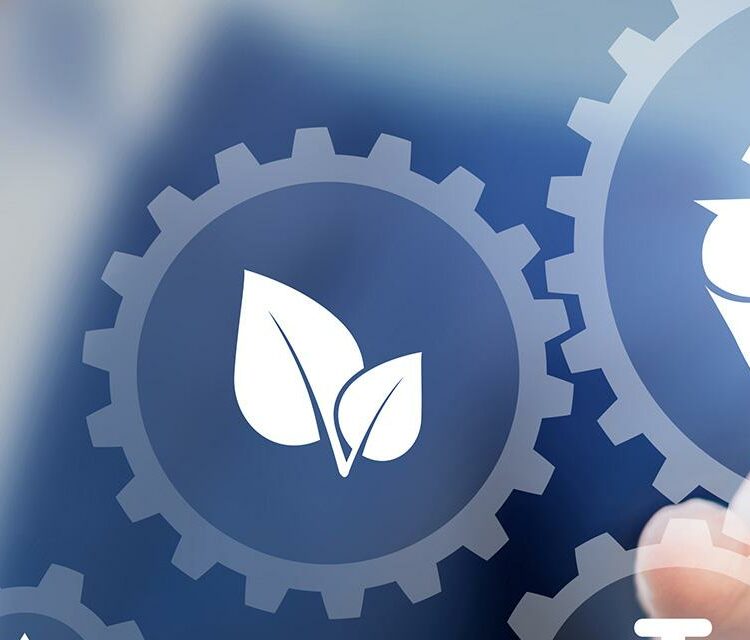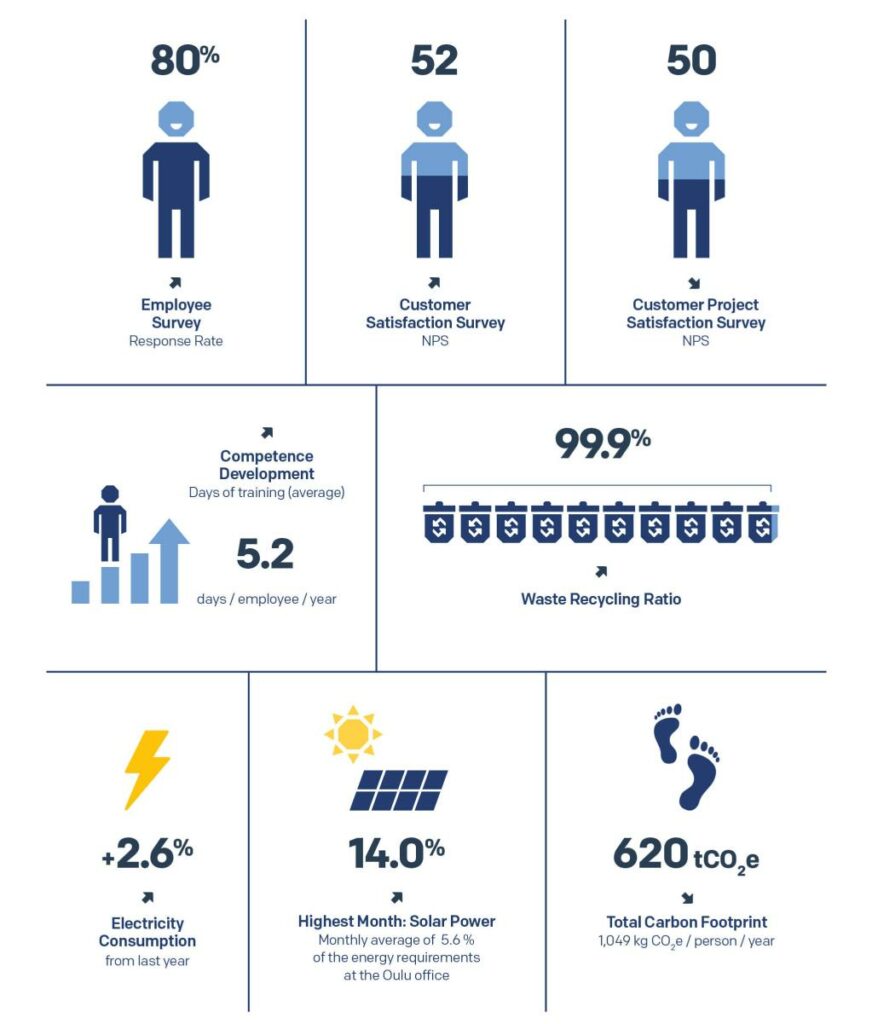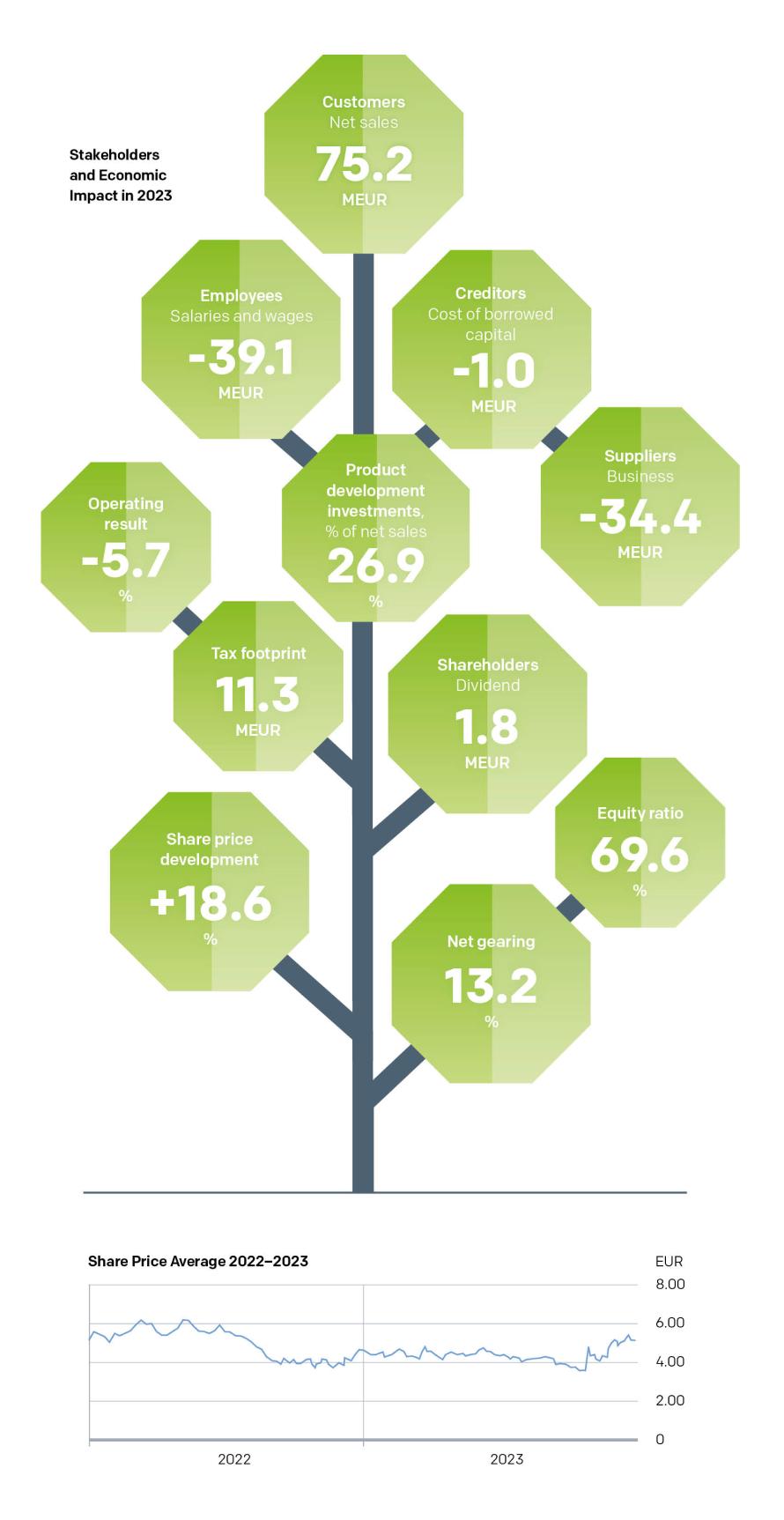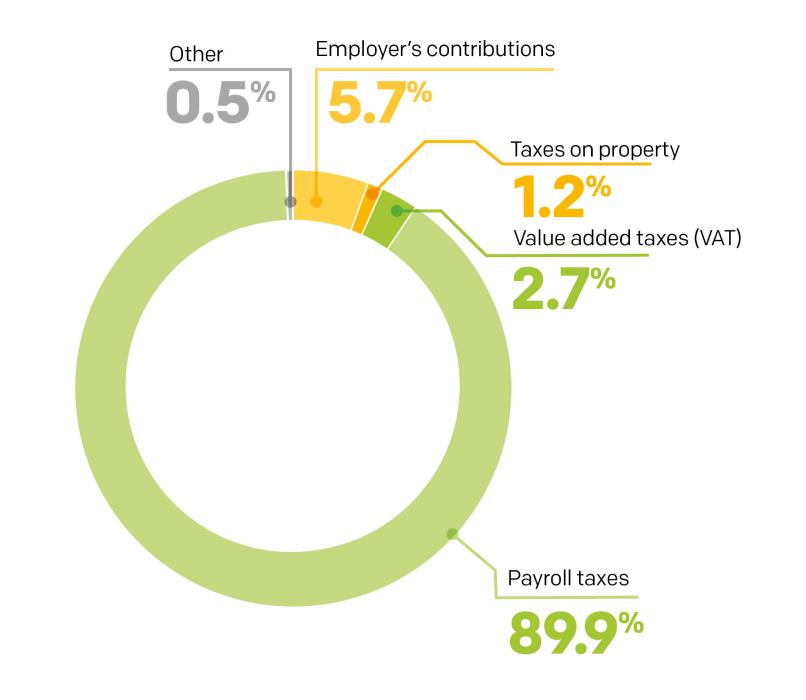Sustainability at Bittium
Sustainability is present in Bittium´s operations throughout the life cycle of its products, in procurement chains and in the way the company creates value for the surrounding society.

Sustainability Highlights 2023

Economic Impact
Bittium’s goal is to operate cost-efficiently and profitably in the long term. This creates added value for the company’s various stakeholders and the surrounding society. Profitable operations create economic benefits for shareholders, employees, partners, subcontractors, distributors, customers, municipalities, and the state.
Legal compliance is the basic premise of economic responsibility. However, in many respects, Bittium’s sustainability and impact exceed the legal requirements. Economic responsibility also includes the company’s anti-corruption practices, according to which we require our personnel and partners to commit to our anti-corruption operating guidelines.
Bittium invests in the development of customer relationships and the company’s expertise in order to provide reliable products and services to customers. Bittium’s cooperation with the company’s supplier and subcontractor network is based on professionalism and a long-term approach. Partners are selected carefully and required to operate in accordance with the Supplier Code of Conduct.
Creating Added Value for Stakeholders
With respect to Bittium’s economic impact, the local dimension is what matters most. Local added value is generated especially through Bittium’s direct and indirect employment impact. On a larger scale, Bittium’s impact extends via tax payments, dividends and business impacts into the countries in which the company operates around the world. Bittium’s dividend policy takes into account the Group’s result, financial position, capital needs and the financing required for growth.
Bittium is present in Europe, the Americas and Asia. The majority of the company’s employees work in Finland, more than half of them in the city of Oulu.
Ensuring added value means securing long-term growth and financial stability, comprehensive risk management and a long-term commitment to the development of society and local communities. In addition to financial risks, risk management must take into consideration other risks related to the valuation of the company, such as reputational risks.

Tax Footprint
Taxes are part of Bittium’s business process, and tax management supports the company’s strategy.
Bittium’s tax strategy is to support business decisions and ensure their proper execution also from the perspective of taxes. Tax planning supports business efficiency and productivity, creating added value for shareholders and ensuring regulatory compliance. Bittium’s tax planning is not aggressive and it is always based on actual business needs, instead of artificial arrangements.
Bittium’s tax strategy aims at making sure that the company calculates, reports, and pays taxes correctly to the authorities, in compliance with the regulations in effect. As Bittium operates in five countries, the starting point is to comply with the local legislation and meet the local obligations. The company’s guiding principle is to be open and transparent with the tax authorities in all the countries in which it is present. In Finland, Bittium works in close cooperation with the Tax Administration.
Tax Footprint in 2023
| Taxes collected | 2023 | 2022 |
|---|---|---|
| Value added taxes (VAT) | -0.3 | -4.0 |
| Payroll taxes | -10.2 | -10.0 |
| Total | -10.5 | -14.1 |
| Taxes borne | ||
| Employer’s contributions | -0.6 | -0.6 |
| Taxes on property | -0.1 | -0.1 |
| Total | -0.8 | -0.7 |
| Taxes total | -11.3 | -14.8 |

R&D Investments
Bittium operates in a sector that creates products and services for the future through continuous development, innovations and cross-sector cooperation. The company plays an important role at the leading edge of technological development, and active cooperation with academic researchers increases understanding of significant new technologies and promotes the digitalization of society. Bittium has a close and long-established cooperation relationship with the University of Oulu.
In 2023, Bittium was involved in the role of funding provider and research partner in several EU cooperation projects. Examples of these include ITEA4 (software-intensive systems), Horizon2020 (Horizon 2020 framework program), CELTIC – Next (Eureka cluster for next-generation communications for a secured, trusted, and sustainable digital society), EDF (European Defense Fund), and national projects financed by Business Finland.
The focus areas of these cooperation projects included technologies that are highly relevant to Bittium’s future product and service business, such as various communications solutions for the defense industry and authorities, information security solutions related to products, the development of AI and machine learning methods in fields such as health care, the digitalization of product development and, for example, simulation methods for different areas of product development, and methods and operating practices related to regulatory software development. Research projects were also established in 2023 in the focus areas under Bittium’s Leading Company program.
In 2023, the R&D investments were 26.9 percent of the net sales (27.0 percent). The investments focused mainly on developing medical technology products, developing tactical communication system and its products for the defense industry, and special terminal products and their related security software targeted for authorities.
On October 30, 2023, Bittium announced its updated strategy concerning years 2024 and 2025. In the strategy the company is seeking a change from a R&D organization to a customer-oriented, growth-oriented operating model through its segment organizations. Between 2016 and 2023, the company’s two Business Segments, Defense & Security and Medical, have invested strongly in the development of their own products. This has maintained the company’s high average annual R&D investment level of around EUR 20 million, corresponding to an average of approximately 25 percent of the company’s annual net sales. In both product-oriented Business Segments the large product development projects have proceeded into commercial phase. During the next two years period, these segments will now focus on continuous improvement of the competitiveness of existing products and development of features, which is the highly important to competitiveness in both Business Segments. In addition, the company will use development cooperation with other companies in its product development in the future.